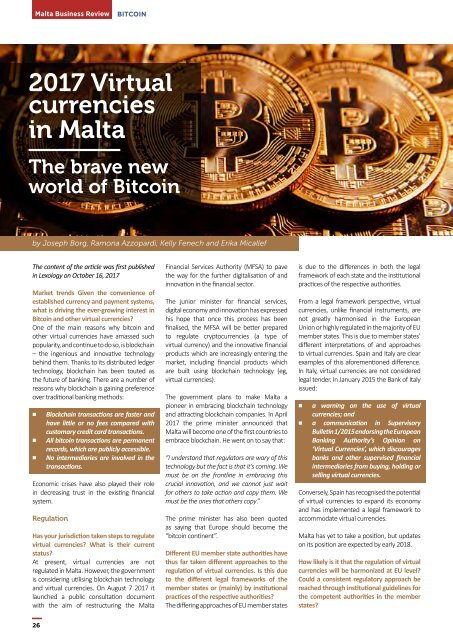Create successful ePaper yourself
Turn your PDF publications into a flip-book with our unique Google optimized e-Paper software.
Malta Business Review<br />
BITCOIN<br />
2017 Virtual<br />
currencies<br />
in Malta<br />
The brave new<br />
world of Bitcoin<br />
by Joseph Borg, Ramona Azzopardi, Kelly Fenech and Erika Micallef<br />
The content of the article was first published<br />
in Lexology on October 16, 2017<br />
Market trends Given the convenience of<br />
established currency and payment systems,<br />
what is driving the ever-growing interest in<br />
Bitcoin and other virtual currencies?<br />
One of the main reasons why bitcoin and<br />
other virtual currencies have amassed such<br />
popularity, and continue to do so, is blockchain<br />
– the ingenious and innovative technology<br />
behind them. Thanks to its distributed ledger<br />
technology, blockchain has been touted as<br />
the future of banking. There are a number of<br />
reasons why blockchain is gaining preference<br />
over traditional banking methods:<br />
• Blockchain transactions are faster and<br />
have little or no fees compared with<br />
customary credit card transactions.<br />
• All bitcoin transactions are permanent<br />
records, which are publicly accessible.<br />
• No intermediaries are involved in the<br />
transactions.<br />
Economic crises have also played their role<br />
in decreasing trust in the existing financial<br />
system.<br />
Regulation<br />
Has your jurisdiction taken steps to regulate<br />
virtual currencies? What is their current<br />
status?<br />
At present, virtual currencies are not<br />
regulated in Malta. However, the government<br />
is considering utilising blockchain technology<br />
and virtual currencies. On August 7 2017 it<br />
launched a public consultation document<br />
with the aim of restructuring the Malta<br />
Financial Services Authority (MFSA) to pave<br />
the way for the further digitalisation of and<br />
innovation in the financial sector.<br />
The junior minister for financial services,<br />
digital economy and innovation has expressed<br />
his hope that once this process has been<br />
finalised, the MFSA will be better prepared<br />
to regulate cryptocurrencies (a type of<br />
virtual currency) and the innovative financial<br />
products which are increasingly entering the<br />
market, including financial products which<br />
are built using blockchain technology (eg,<br />
virtual currencies).<br />
The government plans to make Malta a<br />
pioneer in embracing blockchain technology<br />
and attracting blockchain companies. In April<br />
2017 the prime minister announced that<br />
Malta will become one of the first countries to<br />
embrace blockchain. He went on to say that:<br />
“I understand that regulators are wary of this<br />
technology but the fact is that it’s coming. We<br />
must be on the frontline in embracing this<br />
crucial innovation, and we cannot just wait<br />
for others to take action and copy them. We<br />
must be the ones that others copy.”<br />
The prime minister has also been quoted<br />
as saying that Europe should become the<br />
“bitcoin continent”.<br />
Different EU member state authorities have<br />
thus far taken different approaches to the<br />
regulation of virtual currencies. Is this due<br />
to the different legal frameworks of the<br />
member states or (mainly) by institutional<br />
practices of the respective authorities?<br />
The differing approaches of EU member states<br />
is due to the differences in both the legal<br />
framework of each state and the institutional<br />
practices of the respective authorities.<br />
From a legal framework perspective, virtual<br />
currencies, unlike financial instruments, are<br />
not greatly harmonised in the European<br />
Union or highly regulated in the majority of EU<br />
member states. This is due to member states’<br />
different interpretations of and approaches<br />
to virtual currencies. Spain and Italy are clear<br />
examples of this aforementioned difference.<br />
In Italy, virtual currencies are not considered<br />
legal tender. In January 2015 the Bank of Italy<br />
issued:<br />
• a warning on the use of virtual<br />
currencies; and<br />
• a communication in Supervisory<br />
Bulletin 1/2015 endorsing the European<br />
Banking Authority’s Opinion on<br />
‘Virtual Currencies’, which discourages<br />
banks and other supervised financial<br />
intermediaries from buying, holding or<br />
selling virtual currencies.<br />
Conversely, Spain has recognised the potential<br />
of virtual currencies to expand its economy<br />
and has implemented a legal framework to<br />
accommodate virtual currencies.<br />
Malta has yet to take a position, but updates<br />
on its position are expected by early 2018.<br />
How likely is it that the regulation of virtual<br />
currencies will be harmonized at EU level?<br />
Could a consistent regulatory approach be<br />
reached through institutional guidelines for<br />
the competent authorities in the member<br />
states?<br />
26

















